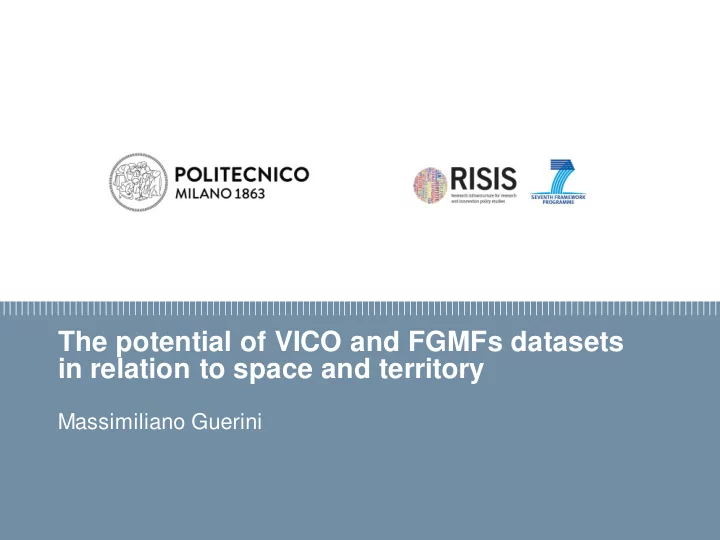

The potential of VICO and FGMFs datasets Firma convenzione in relation to space and territory Politecnico di Milano e Veneranda Fabbrica del Duomo di Milano Massimiliano Guerini Aula Magna – Rettorato Mercoledì 27 maggio 2015
RISIS Demonstrator • Start-ups, SMEs and economic growth: The enabling role of the territory • Why start-ups and SMEs? • Impact on innovation, economic growth and new job creation (e.g., European Commission 2012; Audretsch and Keilbach 2004; 2005; Criscuolo et al. 2014) • In Europe SMEs account for more than one-half of total employment (European Commission, 2014) • However, whether start-ups and SMEs can realize their growth potential depends to the economic and social characteristics of the territory in which they are embedded Massimiliano Guerini
Regions, innovation and competitiveness: why does geography matter? • Localized knowledge spillovers • Localized knowledge spillovers explain differences in regional economic and innovative performance (e.g. Jaffe et al. 1993; Audretsch and Feldman 1996) • Co-location facilitates the creation of linkages, interactions and face-to-face contacts necessary for the transmission of knowledge characterized by a strong tacit component (Boschma, 2005) • Sources of knowledge spillovers: • Universities • Public research organizations • Other firms: • Proximity to customers and suppliers facilitates knowledge flows about which new products have the greatest market potential • Local labor mobility among firms that operate in related industries Massimiliano Guerini
Regions, innovation and competitiveness: why does geography matter? • A different stream of scientific literature has emphasized that geography also plays a fundamental role in the provision of finance • SMEs and start-ups generally find it difficult to get adequate external finance • information asymmetries generate severe adverse selection and moral hazard problems (Carpenter an Petersen, 2002; Denis, 2004) • Investors that are localized in physical proximity of candidate investment targets enjoy an advantage in overcoming information asymmetry barriers (e.g. Sorensen and Stuart, 2001; Guiso et al., 2004) • Opportunity to acquire soft information, develop long-term relationship banking practices with borrowers, better monitoring Massimiliano Guerini
Open issues • How does the presence of local sources of external knowledge contribute to the growth performance of European start-ups and SMEs? • How does geography influence the ability of start-ups and SMEs to absorb different types (scientific and practical) of external knowledge? • T o what extent large established firms can act as gate keepers, indirectly channeling (scientific) knowledge to start-ups and SMEs? • Which characteristics of the local financial system enable this process? • Which type of financial actors – business angels, venture capitalists, private equity investors, and commercial banks, are most helpful in this regard? Massimiliano Guerini
Possible areas of investigation • We aim at understanding: • Whether and how start-ups and SMEs can benefit from the local availability of scientific knowledge developed by universities and PROs • The effect on start-ups and SMEs performance of both vertical and horizontal local linkages with leading innovative firms located in the same territory • To what extent the characteristics of the local financial system amplifies the advantages of being located in regions endowed with a greater amount of sources of local knowledge, either practical or scientific • We also aim at identifying the factors that can reduce the role of geography for the exploitation of knowledge spillovers: • Collaborations with large multinational firms (e.g., in EU funded R&D projects) Massimiliano Guerini
RISIS infrastructure • VICO: data on the provision of equity capital to start-ups from business angels and venture capitalists • Start-ups • VC investors • New dataset FGMF: data on the population, characteristics and location of European fast growing mid-sized firms Other relevant dataset of the RISIS infrastructure: • ETER and Leiden university ranking: data on universities producing knowledge in the relevant scientific fields in which SMEs and start-ups are specialized • CIB: data on the innovative output of private research labs of large innovative firms (CIB) • EUPRO: data on the network of collaborations between large firms, SMEs, start-ups and universities and other research organizations in the context of EU funded R&D projects (EUPRO) Massimiliano Guerini
Connection to WP9 • Harmonization of geographical information across different RISIS infrastructures • Definition of the relevant unit of analysis • Functional Urban Areas as a starting point • Partial application of the UPEMLV method • Identification of initial clusters of: • VC-backed start-ups • VC investors • FGMFs Massimiliano Guerini
Recommend
More recommend